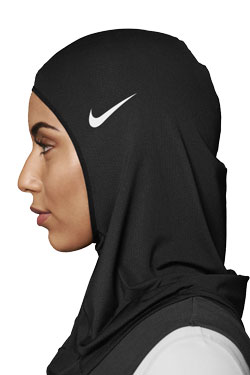Nike recently revealed that they are creating a hijab for Muslim female athletes to wear as they play sports. It is officially being called the “pro-hijab” which is a fitting name for promoting inclusiveness in a time when many Muslims are being alienated and treated like enemies. The Nike hijab will be sold in stores beginning this spring.
The hijab is a traditional head covering that Muslim women wear for religious reasons, but it often goes amiss that wearing the hijab is a personal choice as well. There is a stigma present within Western society associated with the hijab and what it represents.
During the 2016 election process, current President Donald Trump shared what he believes to be the problem with America, “We have a problem in this country it’s called Muslims we know our current president [Obama] is one.”
Whether people admit it or not, there is a general conception, that it represents extremist views. Western liberalism and conservativism has caused many people to exclude what they do not want to understand. That practice results in ignorance, which might explain the current climate of American culture. The pro-hijab is a necessary sportswear item in today’s society because it will promote equality.
Zareen Shueib, a senior business student and Vice President of the Muslim Student Association (MSA), said, “By creating a hijab, I think Nike is really working towards the inclusion of all different types of people. Nike is a renowned for its innovative gear; adding a hijab for Muslim athletes shows the company isn’t afraid of trying new things and I appreciate and respect that.”
The idea behind this hijab was formulated after Emirati Olympic weightlifter, Amna Al Haddad, visited Nike headquarters and spoke about having only one hijab to weightlift in. This started a discussion about the ways in which Nike can design a comfortable alternative hijab seeing that many Muslim female athletes like Haddad have a high physical demand of training for competitions or sports they compete in. The material for this hijab is made of a tight, thin polyester mesh so that it can absorb perspiration. It has taken 13 months to design and while they are still going through iterations, the first person to try on the design is Muslim figure skater Zahra Lari who expressed her happiness with the results.
The product was also tested by Manal Rostom, a Muslim runner and triathlete. In promotion for the pro-hijab, Nike released a video last month featuring Middle Eastern female athletes called “What will they say about you?” This promotion video has garnered over a million views already ensuring that people are at least interested in Nike’s new apparel.
Nicole Gallagher, a junior psychology student, believes, “I think that Nike’s pro hijab movement will enforce a climate of acceptance in society for one’s culture and religious beliefs.”
In the current political crisis today, Nike is one of the latest organizations attempting to dispel the rampant xenophobia led on by the Trump administration. Over the last few years there has been an influx of Middle Eastern female athletes from countries like Saudi Arabia, Brunei and Qatar competing at a professional level. Not only is the pro-hijab about unity and expression of one’s personal beliefs, this item is also helping young girls in less developed countries go after their dreams. This encouragement might be needed by young Muslim American female athletes as well.
Nike has received some negative feedback from the release of the hijab. A recent article from Teen Vogue criticized the sporting-wear. There was Twitter backlash; some people were protesting that they will not buy another product from Nike again because, according to them, the hijab oppresses women.
It is unfortunate today that making a statement about being a Muslim is deemed threatening in Western society to some folks. This is not about the oppression of women. The pro-hijab is a positive movement that aims to liberate Muslim women from feeling like they are outsiders. Muslim women should have the same advantages in sports or competitions, and not experience discrimination because they choose to wear a head scarf.
Some criticize that the global corporation is designing a hijab to simply appeal to Muslim customers, rather than making strides towards equality. Dr. Johanna Foster, an assistant professor of sociology and Director of the Sociology Program, feels that we cannot allow corporations to dictate human rights agenda. “It is extremely important that women and girls of all religious and cultural backgrounds be afforded access to participate in sports in ways that uphold their religious freedoms, but if Nike really cared about that, they wouldn’t need to put a giant Nike Swoosh front and center, nor would they continue to exploit women and girls all around the world in systemic labor exploitation,” said Foster.
Hijabs do not differ from wearing a cross to express one’s faith. Many athletes wear crosses to represent their Christianity. The pro-hijab could be seen as a fashion statement in the future. Olympic track and field star, Gail Devers became popular on and off the track for wearing fashionable nails, maybe Muslim women wearing the hijab could end up being a fashion statement.
There are opposing viewpoints about whether or not Nike’s pro-hijab movement is reinforcing a climate of acceptance in America or targeting a religious group to buy their products. As Americans, we stand for freedom of speech and the right to express religious beliefs. Although, some claim that they will, “never buy another Nike product again,” it was necessary because Muslim women expressed a need for it. However, it was not necessary for the Nike swoosh branded on the sports hijab. Is Nike is actually standing up for the prejudices that Muslims face or are they simply promoting their brand?
IMAGE TAKEN from www.elle.com



